AUSTIN, TX — In 2002, Robert Roberson rushed his 22-month-old daughter, Nikki, to a hospital in Palestine, Texas. According to court records, Nikki had been vomiting, coughing, running high fevers, and suffering from persistent diarrhea for about a week. Roberson had taken her to the doctor multiple times that month, but this time, her condition seemed urgent. She was having trouble breathing and turning blue.
Hospital staff testified that Roberson's behavior seemed off. He appeared emotionless, which they found bizarre. After being convicted of capital murder of his daughter in an Anderson County courtroom, Roberson was later diagnosed with autism while on death row.
Roberson's conviction was based on the now-debunked diagnosis of "shaken baby syndrome."
In 2013, the Texas Legislature passed a law allowing criminal appeals based on debunked science, but by then, Roberson had already spent a decade on death row. Despite this law, it was never accepted as grounds to appeal Roberson's conviction, and he was scheduled to be executed last Thursday.
While Gov. Greg Abbott remained silent, the Texas House Committee on Criminal Jurisprudence raised concerns that their legislation wasn’t being properly applied in this case. The committee persuaded the Texas Supreme Court to delay Roberson’s execution after issuing a subpoena for his testimony.
State Rep. Drew Darby (R-San Angelo), the committee's most senior member, voted with the bipartisan group to halt the execution until their concerns were addressed. The subpoena and political maneuvering granted Roberson about a 90-day reprieve as lawmakers from all branches of the Texas government argue in court about the separation of powers.
On Monday, the Texas Department of Criminal Justice was expected to deliver Roberson to the hearing for his testimony. He was not delivered. Instead, a long list of witnesses testified over 9 hours in support of overturning Roberson's death penalty conviction, including "Dr. Phil" McGraw and novelist John Grisham. A juror from the 2003 trial also testified, stating that their decision was based entirely on the shaken baby syndrome diagnosis, meaning the subsequent decisions denying Roberson relief at the courts of appeal may not have adhered to the 2013 junk science law.
“That was what our decision was based upon,” the juror said.
Former Court of Criminal Appeals Judge Elsa Alcala criticized the court's application of the state's 2013 junk science law. Darby appeared focused on procedural legal barriers and the lack of budget to enforce the law. The committee learned that more legislation would be needed to strengthen the law's application. The Court of Criminal Appeals is the highest state court for criminal cases.
Darby’s questioning also sought to clarify how the appeals process worked. The committee discovered that the prosecution's case evolved as more evidence debunking the original trial emerged.
“It becomes more about winning and less about seeking the truth,” Darby said.
After the hearing, Darby mentioned that the committee is considering traveling to Huntsville to gather Roberson’s personal testimony, though no plans are set.
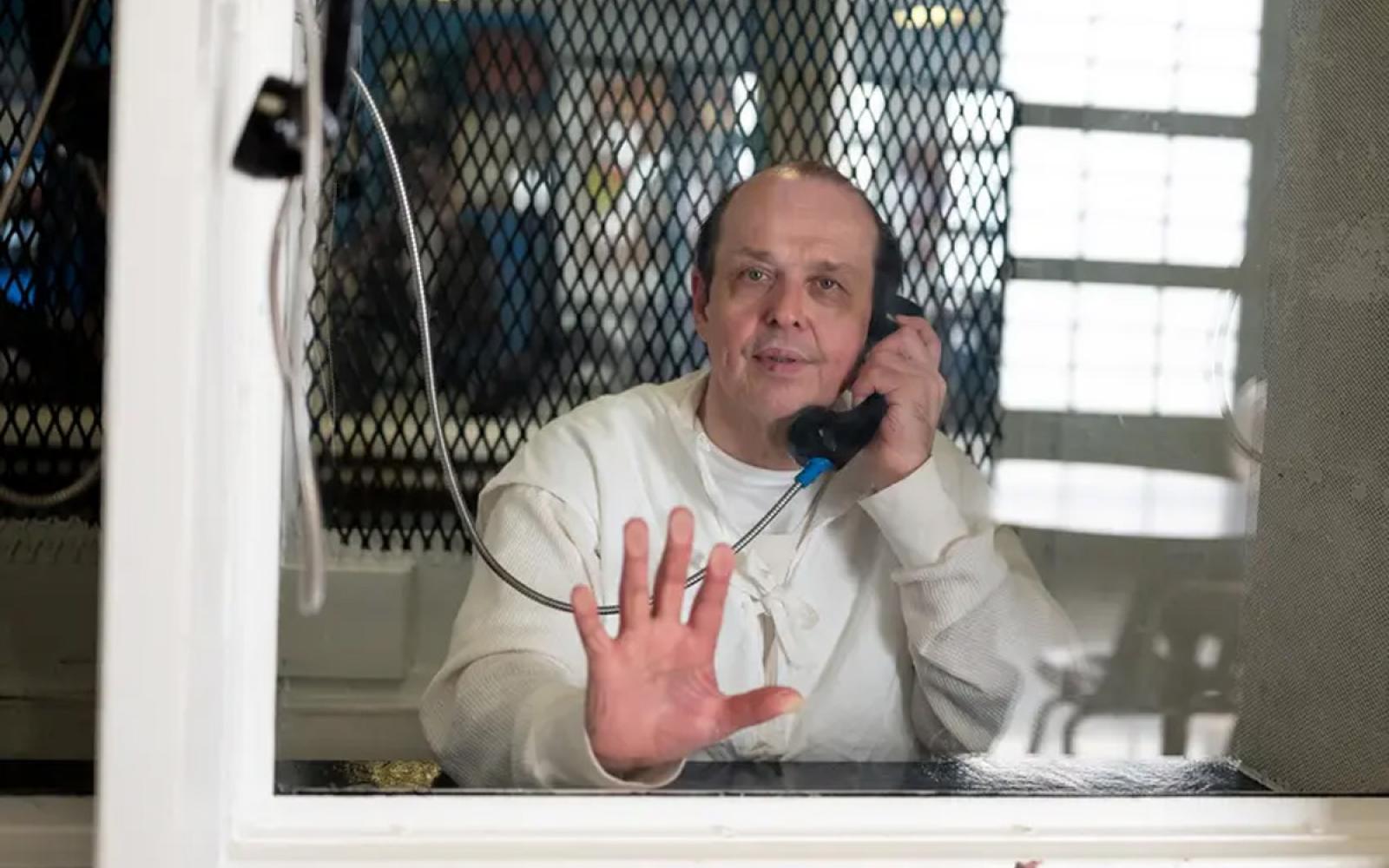
In an amicus curiae brief filed Oct. 20, Gov. Abbott warned the Texas Supreme Court that if they allowed the Texas House Committee’s actions to stand, the legislature could repeat this for every death row inmate facing execution. Abbott argued that the committee overstepped its bounds and infringed on his constitutional authority as governor. He claimed the committee acted too late in the process.
“Only at the eleventh hour, when the Constitution empowers the Governor to make the last move, did the House Committee decide to violate the Separation of Powers Clause,” Abbott wrote.
Abbott also argued that the subpoena was not signed by an officer with the jurisdiction to delay an execution.
Darby believes the committee has about 90 days to fully review the conviction, unless the Texas Supreme Court sides with the governor sooner. The court has requested briefs on the merits from both sides, with deadlines concluding on Nov. 8. Until then, the court’s Oct. 17 order requiring the Texas Department of Criminal Justice to comply with the subpoena and delay Roberson's execution remains in effect.
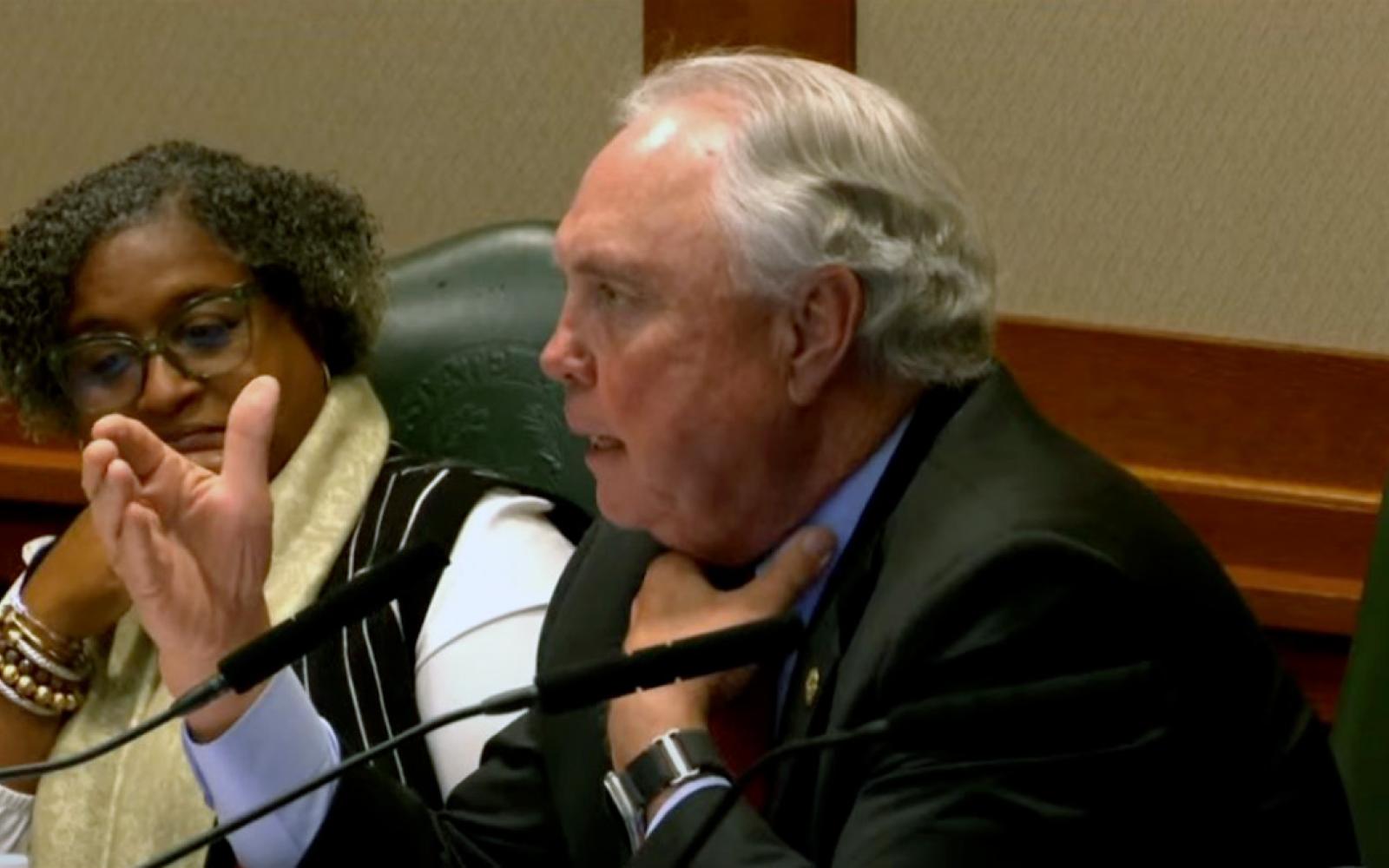
State Rep. Drew Darby (R-San Angelo) questions witnesses at an Oct 21, 2024 hearing about the conviction of death row inmate Robert Roberson.
Subscribe to the LIVE! Daily
Required


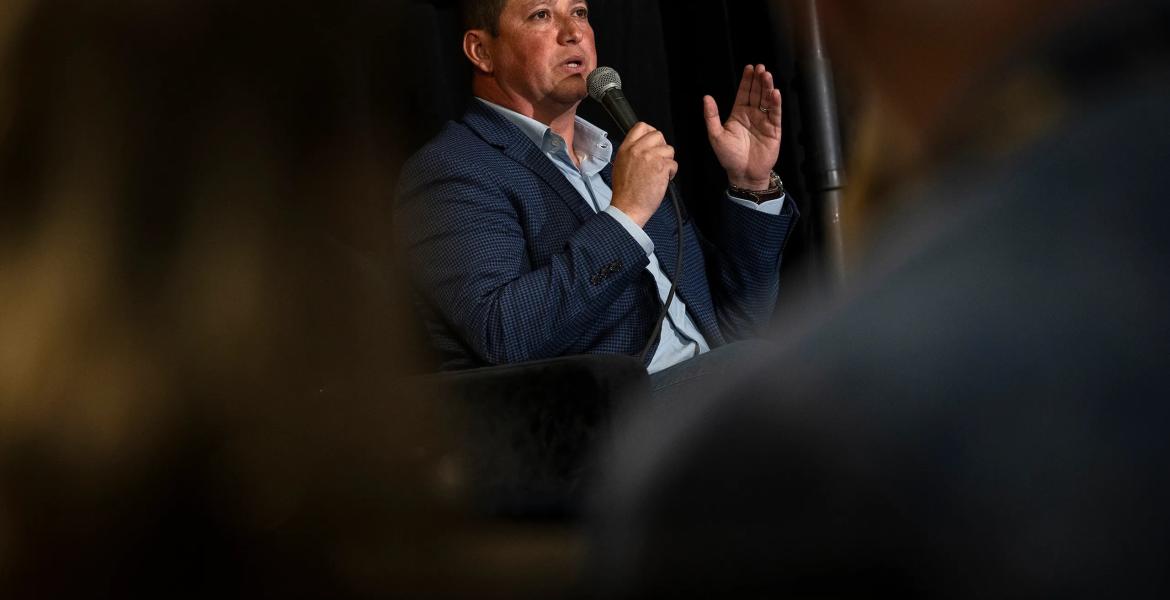
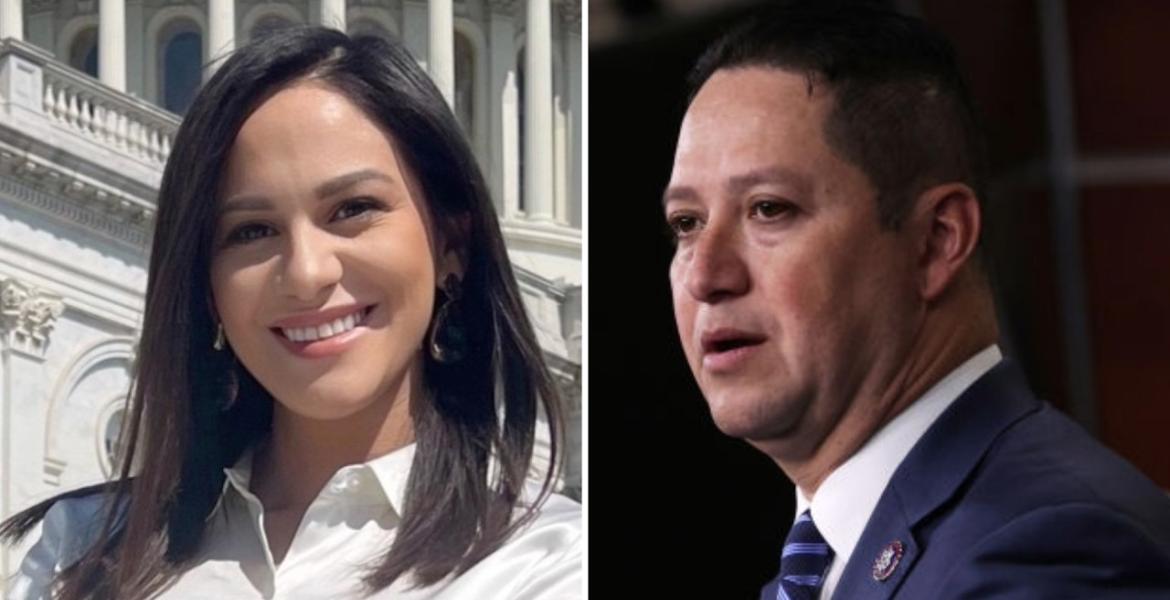
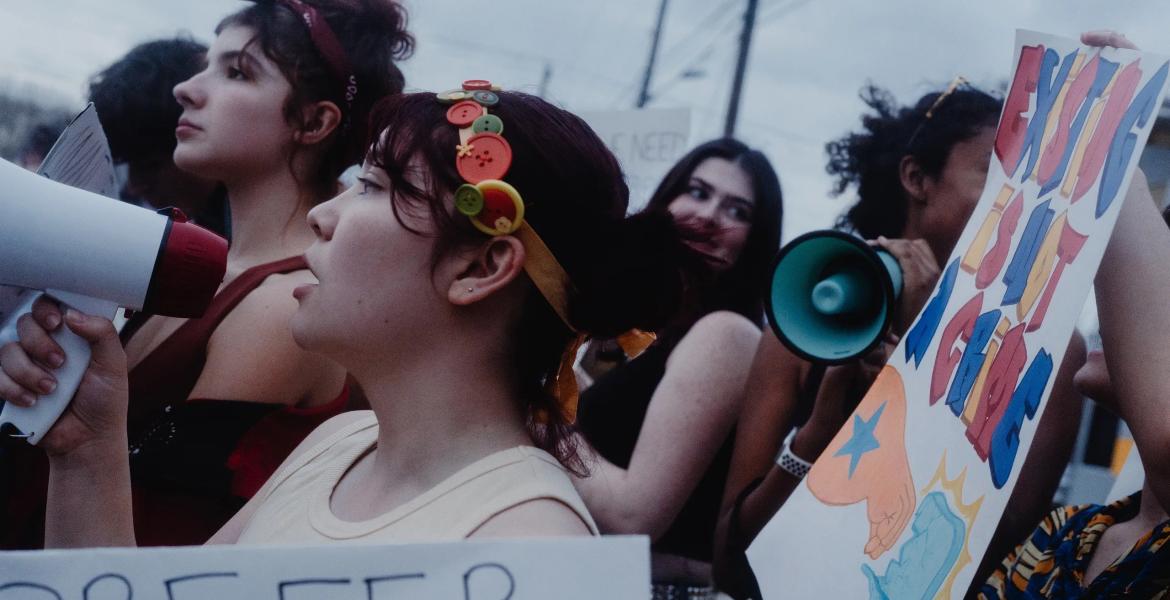

Comments
Listed By: Old Buffalo Hunter
Find another news piece like how to locate Reece Albert's road construction zones. When are we going to get rid of this Rino?
- Log in or register to post comments
PermalinkListed By: sanglo expat
Drew is a source of logic and light in an otherwise dark, dismal, den of demented denizens of trumpmaniaville. He is among the rarest of creatures: a Republican with a functioning brain coupled with a sense of what is good and right.
- Log in or register to post comments
PermalinkListed By: Rita Repulsa
Imagine, if you will, being reduced to the simplest of forms—a worm, writhing in the dirt, silent and unseen. In such a state, you would be utterly reliant on those who govern your environment, trusting that they act in your best interests. But under the leadership of Drew Darby, even this meager hope would be misplaced. Darby, a long-entrenched figure in the Texas House of Representatives, embodies the rot of a political class that has abandoned its responsibilities. His tenure stands as a monument to neglect, a testament to the failure of modern governance.
Consider the roads and bridges of his district, crumbling under years of disrepair. These are not abstract failures but tangible evidence of Darby’s indifference. While rural communities struggle with failing infrastructure, Darby occupies himself with the hollow rituals of politics, voting in favor of budgets that prioritize pet projects and corporate interests over the basic needs of his constituents. The highways and byways that connect his district are left to decay, symbolic of the disconnection between Darby and the people he purports to serve. Were you a worm, dependent on the soil beneath you, Darby’s neglect would doom you to suffocate in poisoned earth.
Economic stagnation is another hallmark of Darby’s reign. Small businesses, the backbone of his district, are left to fend for themselves in an increasingly hostile environment. While Darby panders to corporate donors and out-of-state interests, local entrepreneurs are crushed under the weight of overregulation and indifference. He offers them no relief, no vision, no leadership. Instead, he presides over the slow death of his district’s economic vitality, his inaction a betrayal of those who trusted him to fight for their livelihoods. If you were a worm, struggling to survive in depleted soil, you would find no champion in Darby—only the cold indifference of a man who has forgotten his duty.
Even the natural resources of Texas, so critical to the survival of its people, are squandered under Darby’s watch. Water grows scarcer, energy less reliable, and the land itself deteriorates from overuse and mismanagement. Yet Darby, ever the servant of powerful lobbies, turns a blind eye to these crises. He offers no solutions, no stewardship, only a rubber stamp for the interests that have bought his loyalty. Were you a worm, reliant on the health of your environment, you would see in Darby not a protector but an agent of your destruction.
But perhaps the most damning indictment of Drew Darby is his utter lack of accountability. He does not represent his constituents; he represents his own career. Shielded by years of incumbency and the apathy of a disengaged electorate, Darby has grown fat on the privileges of power while the people of his district are left to languish. He does not listen to their concerns, nor does he act on their behalf. His role is ceremonial, his presence a placeholder. If you were a worm, voiceless and unseen, you would embody the plight of countless Texans ignored by a man who long ago ceased to care.
Darby’s failures are not isolated; they are systemic. He is a symptom of a political order that rewards complacency and punishes initiative. His neglect of infrastructure, his betrayal of small businesses, his abandonment of environmental stewardship—all of these are the natural outcomes of a system that prioritizes the interests of the few over the needs of the many. Drew Darby is not a leader; he is a relic, a vestige of a dying order that has outlived its usefulness.
The people of his district must demand better. They must demand representation that is active, engaged, and unafraid to confront the challenges of the day. They must reject the hollow promises and empty gestures of men like Darby and instead seek leaders who will fight for their future. For as long as Darby remains in power, the people of his district will remain like worms in the dirt—silent, ignored, and left to suffer the consequences of his indifference.
- Log in or register to post comments
PermalinkPost a comment to this article here: